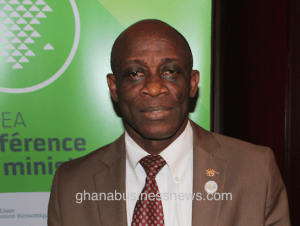Ghana economy turning around – Minister

The Minister of Finance, Seth Terkper says Ghana’s economy is experiencing a turnaround from the fiscal consolidation programme over the past two years and the medium term prospects are bright.
Though there are risks to the medium term prospects which need to be managed, Seth Terkper emphasized that significant improvements are expected in GDP growth, power generation, inflation, public debt and other indicators.
GDP growth is expected to receive a boost amidst the challenging environment, from production of oil and gas from the TEN and Sankofa projects, while improvements in power generation are also expected to continue from ongoing projects and with the support of the recent energy sector levies.
According to the Minister, the fiscal deficit reduced from 10.1 in 2013, to a provisional 7 per cent in 2015, and a further reduction of 5.3 per cent is targeted for 2016.
“This is the first time since 2005 – from the HIPC era – that our primary balance is coming close to being positive or at least breaking even,” he said.
The wage bill was reduced from 57.6 per cent of revenue in 2013, to 44.2 per cent in 2015 and is expected to drop lower to 40.6 per cent. From January to September 2015, a total of GH¢111,256,375.44 was saved as 5,861 people were deleted from the payroll.
Mr Terkper maintained, accumulation of public debt has started slowing for the first time since 2008 and would improve as escrow accounts refinance infrastructure projects, along with other elements in the debt management strategy.
The Cedi he also said, is continuing its stabilization since the last quarter of 2015 from forex inflows, and inflation currently at 17.7 per cent, is also beginning to stabilize from the central bank’s tight monetary policy rate of 26 per cent.
Despite the turnaround, the Finance Minister conceded there are risks to the progress being made, prominent among them, the usual election year pressures – labour agitations for wage increases which often lead to deficits.
A recent report by Standard and Poors also noted that avoiding the ritual election year overruns would be key to maintaining Ghana’s stable outlook.
The slowdown and moderate growth in the Chinese economy and low commodity prices, especially gold and oil, still pose a risk to the country.
By Emmanuel Odonkor
